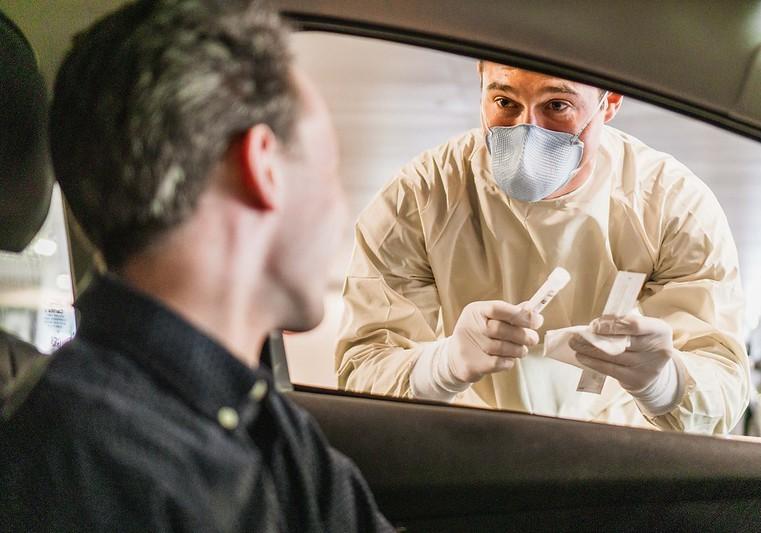As US COVID-19 cases continue to steadily rise, the White House today announced a new effort to make Pfizer's COVID-19 antiviral drug Paxlovid more accessible across the country.
As part of the effort, the Biden Administration today opened the nation's first federally supported "Test-to-Treat" site, in Rhode Island.
Expanding test-to-treat efforts
Noting that Paxlovid has been shown to reduce the risk of hospitalization or death by about 90% in people with COVID-19, the White House said in a news release it has "moved quickly to ensure that these treatments are widely available and that health care providers and patients know about their availability and efficacy."
The federal Test-to-Treat initiative helps make it easier for people to quickly access oral COVID-19 drugs like Paxlovid. More than 2,500 Test-to-Treat locations are now operational across the country at local pharmacies and community health centers, up from 2,200 a month ago.
"We have dramatically increased the number of people benefiting from oral antivirals in the last seven weeks, from about 27,000 prescriptions filled each week to more than 182,000 last week—a more than six-fold increase," the White House said. "We have also doubled the number of sites where Paxlovid is available nationally."
The federally supported Test-to-Treat clinic in Rhode Island is located in Providence. Federal reimbursement will allow people who test positive for COVID-19 at the clinic to immediately receive a medical assessment and get oral antiviral treatments if they are prescribed. The clinic also offers federally supported vaccination.
The Biden Administration will also deploy clinical personnel to support staffing across several of Minnesota's state-run testing sites to transform them into Test-to-Treat sites that will provide testing, an assessment from a medical provider, and oral antivirals. This allows Minnesota to expand its capacity and reach, the White House said.
The administration said it will open federally supported Test-to-Treat sites in New York state and Illinois, and possibly elsewhere, in the coming weeks.
It also said it has expanded the number of US locations at which patients can receive oral antiviral drugs, from about 20,000 a month ago to almost 40,000 now. The White House said 40% of them are located in communities that have high levels of social vulnerability.
Campuses, schools reinstate masks
As US cases rise, led by highly transmissible Omicron subvariants, some universities and public school systems have reinstated indoor mask mandates on their campuses, the New York Times reports.
The University of Hawaii expanded indoor masking yesterday to all 10 of its campuses in light of Centers for Disease Control and Prevention (CDC) data on local disease transmission. Likewise, the University of Delaware cited rising cases and hospitalizations when it announced a mask mandate effective 2 days ago.
And school districts now re-imposing indoor masking include Providence and Central Falls in Rhode Island. Philadelphia schools returned to indoor masking earlier this week.
The Times notes that cases are starting to level off in New York, New Jersey, and Rhode Island.
The 7-day average of new daily cases is 110,614, with 361 daily deaths, according to the New York Times tracker. That's up from 107,316 cases and 312 daily deaths 2 days ago and up from 103,231 daily cases a week ago.
Federal officials, however, reported 205,205 new COVID-19 cases yesterday and 1,017 new deaths, according to the Johns Hopkins COVID-19 tracker.
Global COVID-19 developments
- The World Health Organization has launched a compilation of 20 good-practice examples of effective, creative ways to communicate COVID-19 information, including initiatives directed at the health workforce, media representatives, researchers, and the public, including older people and children.
- Taiwan today reported 81,907 new COVID-19 cases, down slightly from the day before, and 104 deaths.
- China has 545 new cases, 415 of which are asymptomatic, and 1 new death, and Shanghai is easing more restrictions, as the New York Times spotlights growing concerns over the country's lockdown-related economic downturn.





















